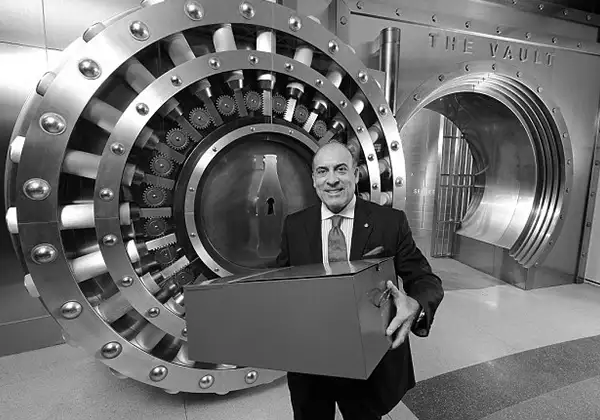On a hot summer afternoon in 2006,
Ibrahim Dimson walked swiftly through Atlanta’s Hartsfield-Jackson
International Airport clutching a yellow Girl Scout cookie box stuffed
with $30k in rolled-up $50 and $100 bills.
Minutes earlier, he’d handed off an
Armani Exchange duffle bag containing dozens of stolen Coca-Cola
documents and a vial of a secret formula — all marked “highly
confidential” — to “Jerry,” a man who claimed to be a Pepsi executive.
Everything was going according to plan.
Dimson and his inside source at Coke had hundreds of trade secrets they
planned to sell to Pepsi, and this was just the beginning.
But there was a just one problem: Jerry
wasn’t who he claimed to be — and unbeknownst to Dimson and his
accomplices, the shit was about to hit the fan.
Woman on the inside
At Coca-Cola, secrecy is the lifeblood of corporate culture.
Workers are routinely subjected to
security checks. Surveillance cameras dot every corner of the building.
Their crown jewel, the original Coke formula, is supposedly locked in a
multi-million dollar vault; only two people on Earth know it, and they
fly on separate planes when traveling in case of an accident.

Former Coca-Cola CEO, Muhtar Kent, stands in front of a multi-million dollar vault that supposedly hold the secret Coke recipe (via Coca-Cola archives)
In this hyper-secretive culture, Joya Williams was the model employee.
The daughter of a church deacon and a Sunday school superintendent, she’d worked for 3.5 years at Coca-Cola’s largest bottling factory before joining corporate in 2005. As the administrative assistant to the Global Head of Marketing, she was entrusted with sensitive emails, internal documents, and yet-to-be-released products, according to a 2007 article in Atlanta magazine.
But 14 months into her $50k-per-year job, she began to feel she wasn’t being treated right — and she formulated a plan to stab them in the back.
Hatching the plan
In late 2005, Williams was introduced
to a friend of a friend named Edmund Duhaney. A 40-year-old father of
three, Duhaney had just gotten out of prison on cocaine charges and was
looking for work.
Williams told him she possessed a trove
of “highly classified” Coca-Cola documents that would likely be worth
money to the company’s major competitor, Pepsi — but she’d signed a
non-disclosure agreement and couldn’t deliver the goods herself.
She needed a middle-man, and Duhaney
knew just the guy: his buddy Ibrahim Dimson, a young white-collar
embezzler and self-proclaimed “charmer” he’d met in prison.
Under the alias “Dirk,” Dimson sent a
letter (in an official Coca-Cola envelope) addressed to a Senior VP at
Pepsi, claiming he was a high-level Coca-Cola executive with “extremely
confidential” trade secrets.

Recreation of a letter Dimson (as “Dirk”) sent to Pepsi (The Hustle, via DoJ transcripts)
Two weeks later, much to the delight of Joya Williams, Dimson received a call from a supposed PepsiCo employee by the name of “Jerry.” He was interested and asked Dimson for proof he could deliver.
Dimson faxed Jerry 14 pages of Coca-Cola documents — almost all marked “confidential information” or “classified-highly restricted” — and told Jerry that he needed to wire money to a provided bank account to show he was a “serious partner.”
Shortly thereafter, he received a transfer for $5k. And then, the real heist began.
Big money
As a trusted middle-woman between
top-level execs, Joya Williams procured not just troves of documents
(presentations, internal emails, development proposals), but actual
samples of unreleased products.
Late one night at the Coca-Cola
Headquarters — a towering, modern monstrosity in midtown Atlanta —
Williams stuffed her bag with manila folders of classified paperwork and
a small vial of a “secret” product under development.
Once procured, these artifacts were
passed on to Dimson, who promptly convinced Jerry to purchase them for
$75k — $30k upfront and $45k later after tests.
In mid-June, the two met at Hartsfield-Jackson International airport in Atlanta, where, in broad daylight, Dimson handed over a brown Armani Exchange duffle bag full of the goods in exchange for a Girl Scout cookie box stuffed with cash.
Dimson left the airport, got into a car with his pal, Duhaney, and booked it to Decatur, Georgia, where they divvied up the dough: $2k for Duhaney, $6k for Williams, and the lion’s share, $22k, for Dimson himself.
But the real payday came 10 days later, when Jerry rang Dimson and offered $1.5m for the remaining trade secrets.
The trio had struck gold. Or so it seemed…
Will the real Jerry please stand up?
See, Jerry wasn’t actually a Pepsi exec: he was FBI Special Agent Gerald Reichard (AKA Gerry).
Months earlier, when Pepsi received the
trio’s initial letter, they’d promptly forwarded it to Coca-Cola, and
informed them they had a leaker. In turn, Coca-Cola had brought in the
FBI to conduct an undercover investigation.
On July 5, 2006, Williams, Dimson, and Duhaney were arrested on charges of wire fraud and unlawfully stealing and selling trade secrets.
An illustration of Duhaney (left), Williams (center), and Dimson (right) in court
In a swift trial, Duhaney and Dimson were handed 2- and 5-year prison sentences, respectively. “This should have died where it started,” Duhaney bemoaned in court: “a mere fantasy.” Williams initially denied the allegations and maintained that her accomplices had “double-crossed” her — but facing an insurmountable heap of evidence, she ended up spending 8 years in the can. “[It’s] like something from a spy novel,” Williams’ lawyer told reporters.
In a swift trial, Duhaney and Dimson were handed 2- and 5-year prison sentences, respectively. “This should have died where it started,” Duhaney bemoaned in court: “a mere fantasy.” Williams initially denied the allegations and maintained that her accomplices had “double-crossed” her — but facing an insurmountable heap of evidence, she ended up spending 8 years in the can. “[It’s] like something from a spy novel,” Williams’ lawyer told reporters.


No comments:
Post a Comment